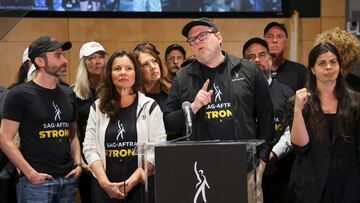Why are Hollywood actors going on strike? SAG-AFTRA announces work stoppage
Performers represented by SAG-AFTRA are to go on strike after the union failed to agree a new contract with the Alliance of Motion Picture and Television Producers.


The Hollywood union SAG-AFTRA, which represents 160,000 performers including film and TV actors, has announced that its members are to go on strike after the body’s negotiators failed to agree a new pay deal with major studios.
Last month, SAG-AFTRA’s members voted overwhelmingly to strike if the union was unable to come to an agreement with the Alliance of Motion Picture and Television Producers (AMPTP), which represents studios including Paramount Pictures, Universal Pictures, Walt Disney Studios and Warner Bros.
AMPTP “devaluing the work of our members” - SAG-AFTRA chief
“Because the AMPTP remains unwilling to offer a fair deal on key issues that are essential to protecting the livelihoods of working actors and performers, SAG-AFTRA’s national board unanimously voted [this morning] to issue a strike order against the studios and streamers,” Duncan Crabtree-Ireland, SAG-AFTRA’s national executive director and chief negotiator, told a press conference today.
“The AMPTP has remained steadfast in its commitment to devaluing the work of our members. Actors deserve a contract that reflects the changes that have taken place in the industry.”
We will be going live soon with a press conference from SAG-AFTRA Plaza regarding a TV/Theatrical/Streaming strike. #SAGAFTRAstrong https://t.co/pw0SJDzjpU
— SAG-AFTRA (@sagaftra) July 13, 2023
At Thursday’s UK premiere of Oppenheimer, director Christopher Nolan revealed that actors from the movie, including stars Killian Murphy and Emily Blunt, had left the event to join the strike.
Christopher Nolan says the cast of #Oppenheimer left the premiere to ‘go and write their pickets’ and join the strike pic.twitter.com/rc2SaSxcfk
— Deadline Hollywood (@DEADLINE) July 13, 2023
Why are SAG-AFTRA’s members going on strike?
The SAG-AFTRA strike action comes two months after screenwriters represented by the Writers Guild of America (WGA) began their first work stoppage since 2007. It is the first time in over 60 years that Hollywood actors and writers have been on strike simultaneously.
The reasons for the WGA strike overlap with SAG-AFTRA’s motives for walking out. Both are demanding higher royalty payments - known as residuals - from content shown on streaming platforms. The two bodies are additionally seeking limits on the use of artificial intelligence (AI) in content creation.
SAG-AFTRA is also eager to curb the industry’s increasing reliance on performers submitting self-taped auditions.
“Soon unsustainable to pursue a career working under these conditions”
“Compensation has been undercut by inflation and by a streaming ecosystem through which producers pay less residual income than traditional exhibition models,” SAG-AFTRA says on its website. “Unregulated use of artificial intelligence threatens the very voices and likenesses that form the basis of professional acting careers.”
The guild adds: “The shift to burdensome and unreasonably demanding self-taped auditions means that our members are working harder than ever, forced to take on audition costs that have always been the responsibility of casting and production.
Related stories
“Without transformative change in the TV/Theatrical contracts, it will soon be unsustainable to pursue a career working under these conditions.”
SAG-AFTRA combines the Screen Actors Guild and the American Federation of Television and Radio Artists, which merged in 2012.

